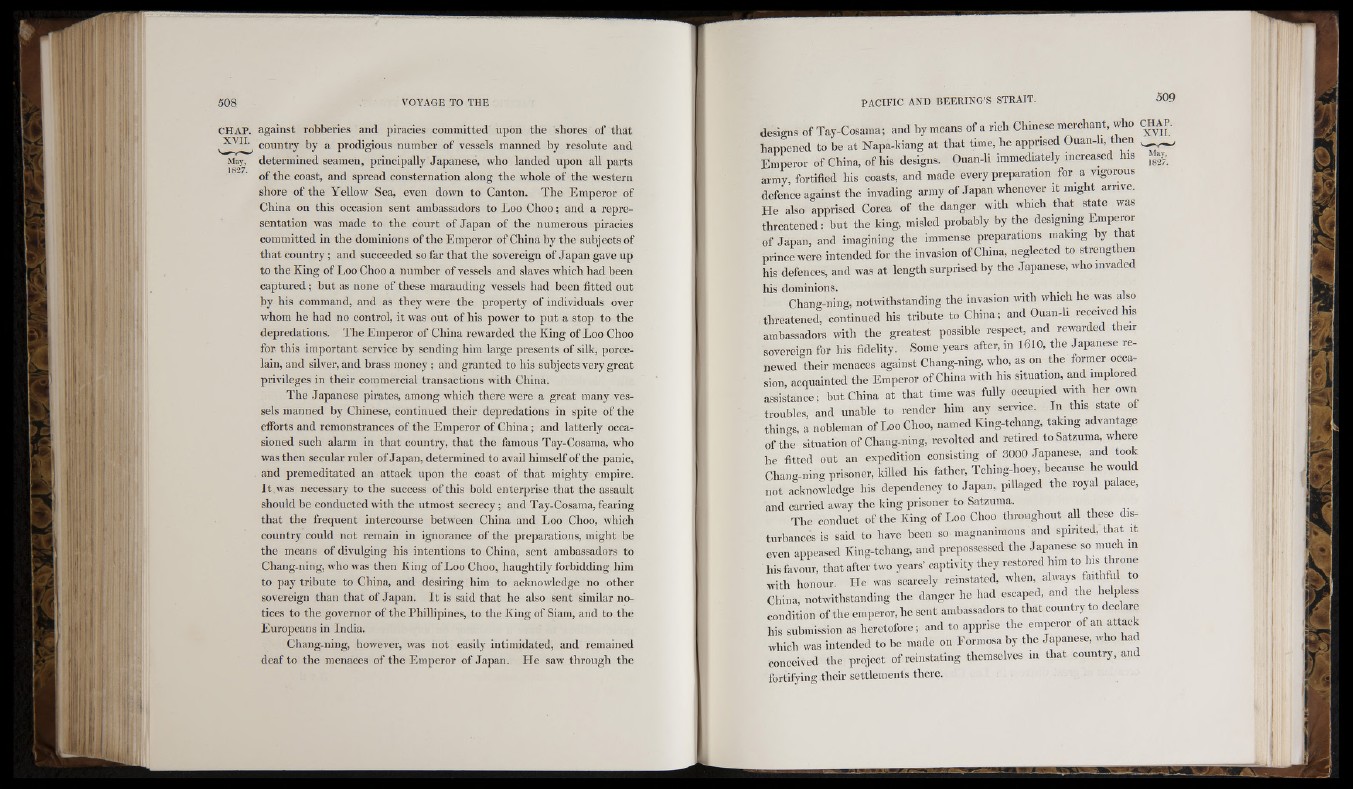
against robberies and piracies committed upon tbe shores of that
country by a prodigious number of vessels manned by resolute and
determined seamen, principally Japanese, who landed upon all parts
of the coast, and spread consternation along the whole of the western
shore of the Y’ellow Sea, even down to Canton. The Emperor of
China on this occasion sent ambassadors to Loo Choo ; and a representation
was made to the court of Japan of the numerous piracies
committed in the dominions of the Emperor of Cliina by the subjects of
that country ; and succeeded so far that the sovereign of Japan gave up
to the King of Loo Choo a number of vessels and slaves which had been
captured ; but as none of these marauding vessels had been fitted out
by his command, and as they were the property of individuals over
whom he had no control, it was out of his power to put a stop to the
depredations. The Emperor of China rewarded the King of Loo Choo
for this important service by sending him large presents of silk, porcelain,
and silver, and brass money ; and granted to his subjects very great
privileges in their commercial transactions with China.
The Japanese pirates, among which there were a great many vessels
manned by Chinese, continued their depredations in spite of the
efforts and remonstrances of the Emperor of China ; and latterly occasioned
such alarm in that country, that the famous Tay-Cosama, who
was then secular ruler of Japan, determined to avail himself of the panic,
and premeditated an attack upon the coast of that mighty empire.
Jt was necessary to the success of this bold enterprise that the assault
should be conducted with the utmost secrecy ; and Tay-Cosama, fearing
that the frequent intercourse between China and Loo Choo, which
country could not remain in ignorance of the preparations, might be
the means of divulging his intentions to China, sent ambassadors to
Chang-ning, who was then King of Loo Choo, haughtily forbidding him
to pay tribute to China, and desiring him to acknowledge no other
sovereign than that of Japan. It is said that he also sent similar notices
to the governor of the Phillipines, to the King of Siam, and to the
Europeans in India.
Chang-ning, however, was not easily intimidated, and remained
deaf to the menaces of the Emperor of Japan. He saw through the
designs of Tay-Cosama; and by means of a rich Chinese merchant, who CHAP.
happened to be at Napa-kiang at that time, he apprised Ouan-li, then
Emperor of China, ofhis designs. Ouan-li immediately increared his
May,
1827.
army, fortified his coasts, and made every preparation for a vigorous
defence against the invading army of Japan whenever it might arrive.
He also apprised Corea of the danger with which that state was
threatened: but the king, misled probably by the designing Emperor
of Japan, and imagining the immense preparations making by that
prince were intended for the invasion of China, neglected to strengthen
his defences, and was at length surprised by the Japanese, who invaded
his dominions. , . , , i
Chang-ning, notwithstanding the invasion with which he was also
threatened, continued his tribute to China; and Ouan-li received his
ambassadors with the greatest possible respect, and reirarded their
sovereign for his fidelity. Some years after, in 1610, the Japanese renewed
their menaces against Chang-ning, who, as on the former occasion,
acquainted the Emperor of China with his situation, and nnploied
assistance; but China at that time was fully occupied ivith her own
troubles, and unable to render him any service. In this state of
thinis, a nobleman of Loo Choo, named King-tchang, taking advantage
of the situation of Chang-ning, revolted and retired to Satzuma, where
he fitted out an expedition consisting of 8000 Japanese, and took
Chang-ning prisoner, killed his father, Tching-hoey, because he would
not acknowledge his dependency to Japan, pillaged the royal palace,
and carried away the king prisoner to Satzuma.
The conduct of the King of Loo Choo throughout all these disturbances
is said to have been so magnanimous and spirited, that it
even appeased King-tchang, and prepossessed the Japanese so much in
his flwour, that after two years’ captivity they restored him to h.s throne
with honour. He was scarcely reinstated, when, always faithful to
China, notwithstanding the danger he had escaped, and the help ess
condition of the emperor, he sent ambassadors to that country to declare
his submission as heretofore; and to apprise the emperor of an attack
which was intended to be made on Formosa by the Japanese, who had
conceived the project of reinstating themselves in that country, and
fortifying their settlements there.
â
r r i .